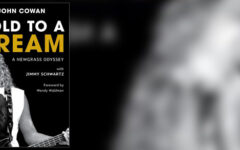
Author Barbara Martin Stephens was the common-law wife of Jimmy Martin, much troubled bluegrass star of the 1950s onwards.
Her personal story, Don’t Give Your Heart to a Rambler: My Life with Jimmy Martin, the King of Bluegrass, relates the life of a young lady who grew up in Memphis and moved to Nashville at the age of 9, became somewhat self-sufficient, finding schooling easy until graduating at the age of 15, and at the age of 17 meeting a 25-year old Jimmy Martin, who immediately commenced to pursue the teenager.
It was nearly a decade afterwards that Martin recorded the Jimmie Skinner song that gives the very apt title to this book. What took him so long! I expect that a few ladies might have preferred to have received the advice earlier. Not so Stephens, she always knew that Martin was a rambler, she says.
By that time, Stephens had, at the age of 16 years, married and, a year later, she had a son, Michael Hollis Morgan, and became a widow as her husband was killed in action.
What follows is a tale of man’s multiple weaknesses, man’s inhumanity to man – and women. Jimmy Martin was a troubled soul, whose father died at a young age, an event that appeared to affect Martin for the rest of his life, as did the lack of love from his mother, who re-married and showered her affection on her subsequent children. Lacking in self-esteem, he was not sure how to love or show love. He enjoyed drinking and this probably accounts for most of his foibles, his aggressiveness, his abuse of others, both mental and physical. He was impulsive in his chasing of women, some of whom bore him children – the author certainly speaks of one.
Stephens herself was not exempt from infidelities, having a one-night-stand with Ray Price and a long-term relationship with Bobby Osborne, and she has been candid about these dalliances.
Her story of the last two months of Jimmy Martin’s life is one of conflict, maneuver and counter-maneuver, suspicion and trust. He seems to have been lucid during much, if not all, of the time – receiving and talking to visitors – but, she maintains that then it was he who was mentally and physically abused.
Ultimately the main beneficiaries from Jimmy Martin’s will appear to have been legal people.
Throughout Barbara Martin Stephens made friends with many of country music’s greats of the time, and most of the bluegrass musicians (with whom Jimmy had a working involvement) and their spouses, Roy Clark, Bob Osborne and his wife Pat, Rudy Lyle, L. E. White, Sonny Osborne, Charlie Cline, Paul Williams, who married Jimmy Martin’s half-sister Edria. Others with whom she shared a friendship include those that she met around the country; Wilma Lee and Stoney Cooper, Grandpa and Ramona Jones, and Hawkshaw Hawkins and Jean Shepard (who remained a friend) at Wheeling; Johnny Horton, Merle Kilgore, Carl Belew and Faron Young in Shreveport; and Kitty Wells, Johnnie Wright and Webb Pierce, starting in Detroit.
From a bluegrass music perspective; well, Martin’s obsession with gaining cast membership of the Grand Ole Opry was by general recognition blocked by his former boss, Bill Monroe. The suggestion is that perhaps it wasn’t competition from another band that irked Monroe, but Martin’s dalliance with Monroe’s daughter, Melissa, that continued despite her father’s clearly stated displeasure and Martin’s inability to remain monogamous at the time.
However, the Grand Ole Opry management had enough reasons not to make Martin a cast member by virtue of the fact that he couldn’t be relied upon to uphold the Opry’s standards, not so much that he missed show dates but that they didn’t know whether he would be drunk or sober. He was just too unpredictable and his mood could change in an instance, with barely any provocation to speak of.
As a commentary on their relationship, Stephens identifies two songs that Jimmy Martin wrote; She’s Left Me Again and It’s Not Like Home. Despite the messages in these, Stephens loved his music and gave him all the support that she could.
It may be difficult to over-emphasize her pioneering efforts in the talent agency business; she was the one of the first female booking agents in bluegrass and country music. Whereas Louise Scruggs focussed on managing and organizing bookings for Flatt & Scruggs and later the Earl Scruggs Review, Stephens worked as an agent for a variety of acts, beginning in Wheeling, West Virginia, where initially she worked for Gene Johnson, booking talent for the Wheeling Jamboree. It was later that she set up the Barbara Martin Agency, based in Hermitage, Tennessee, when Johnson moved to Pittsburgh.
In 1958 when the family was “starving,” she bailed them out by organizing bookings for the then member of the Louisiana Hayride herself, and in 1962 she arranged for Martin to play six weeks at the Golden Nugget Hotel and Casino in Las Vegas.
Then in 1964 Stephens became the manager of Gra-Mar Talent, an agency housed on Music Row that Billy Grammar set up with the ‘Martins’ with the intention of booking as many acts – including Onie Wheeler, Grand Ole Opry pianist Del Wood and Wally Fowler among others – as they could recruit.
Previously, beginning in 1954, while he was with the Osborne Brothers, she had helped to promote Martin by sending hand-written letters and records to DJs all across the country. The ‘Martins’ didn’t have a telephone; calls were expensive anyway so, occasionally, they would use a pay-phone.
Stephens did find some love and happiness in her life (and she still enjoys that), primarily in her children, when she had contact with them – separations were often enforced by Martin – her various jobs and her husband, Chuck, despite the fact that she married him on the rebound.
Her writing style is easy on the eye and her very personal story is compelling. In committing her story to paper she remembers the “fun” that she had with Jimmy Martin and concludes that he was “a goodhearted guy.”
Regrets – Barbara Martin Stephens insists that she has none; not for going with Jimmy Martin initially, and not for leaving him when she did.
She shares her life with a considerable degree of bold candor that I was not expecting, and her story, for Don’t Give Your Heart to a Rambler: My Life with Jimmy Martin, the King of Bluegrass, is her very thought-provoking personal story.
Recommended reading, if you don’t mind some of life’s less-savoury elements.
Don’t Give Your Heart to a Rambler, available from publishers, the University of Illinois Press and other book sellers, has an illustrated section with 29 black and white photographs.
The 240-page book, part of the Music in American Life series, is available also in audio format on CDs (with some music included), with narration by the author.
Here is Barbara Martin Stephens speaking about Jimmy Martin and her book ….
Paperback book ISBN 978-0-252-08276-4
E-book format ISBN 978-0-252-09979-3
Fair warning: there are some sexual encounters and female issues mentioned and sometimes little is left to the imagination.







